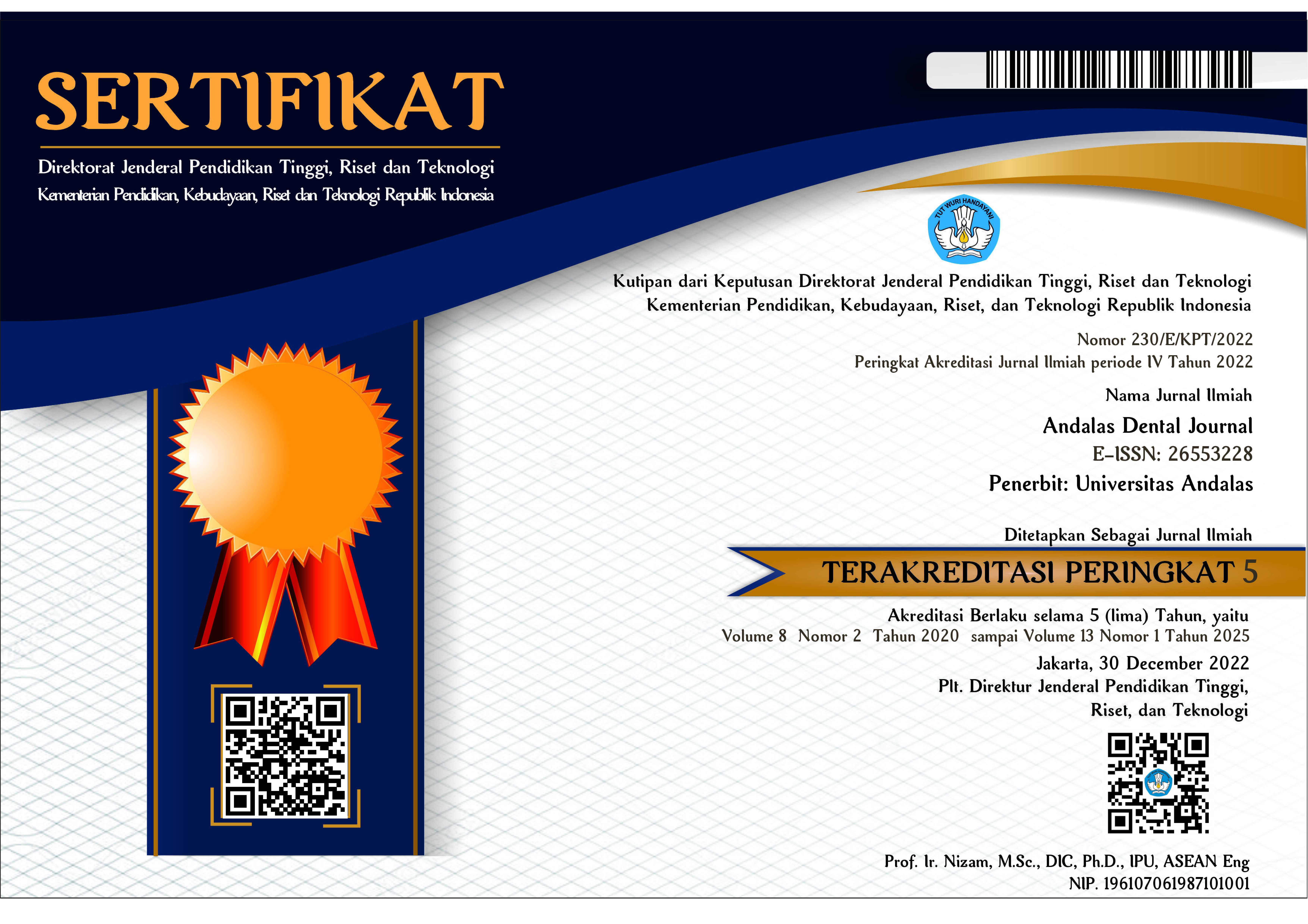Hubungan Perilaku Orang Tua dengan Early Childhood Caries Pada Anak Usia 2-3 Tahun di Kota Padang
Abstract
Caries is a public health problem in the world. According to WHO, an estimated 60-90% of children experience caries. Caries in primary teeth is known as Early Childhood Caries (ECC). The prevalence of ECC in Bukittinggi in 2018 reached 69.2%. ECC often occurs, but less attention from parents, even though parents play an important role in forming behaviors that support or not oral health on children.The purpose of this study is to determine the relationship between parental behavior and Early Childhood Caries on children aged 2-3 years in Padang.The methods of this study used the cross sectional design, with the total sampel were 107 children aged 2-3 years in Padang. The location was selected through Multistage Random Sampling Method and samples was selected through Consecutive Sampling Method. Collecting data is using by questionares and intra-oral examination that were analyzed by Chi-Square test. The results of this study was prevalece of ECC in children aged 2 to 3 years in Padang is 72.9% and def-t index is 3.76. Parents who have a high level of knowledge about 59,8%, 84,1% have a good attitude, and about 63,6% have good practice toward health behavior. The result of analysis showed that p value between parental knowledge and ECC was 0.339, p value between parental attitude and ECC was 0.005 and p value between parental practice and ECC was 1.000. The conclusions of this study is there was no relation between parental knowledge and practice with ECC. There was a significant relation between parental attitude and EEC in children aged 2 to 3 years in Padang.
References
2. WHO. Amerika: Marketing and Dissemination World Health Organization; 2012.
3. GBD. Disease and Injury Incidence and Prevalence Collabolators. 2107. Global, Regional, and National Incidence, Prevalence, and Year lived with diability for 328 diseases and injuries for 195 countries, 1990-2016: a systematic analysis for the Global Burden of Diseases Study 2016. Lancet. 2016; 390(10100): 1211-1259.
4. Meyer F, Enax J. Early Childhood Caries: Epidemiology, Aetiology, and Prevention. International Journal of Dentistry; 2018. p. 1–7.
5. Departemen Kesehatan RI. Riset Kesehatan Dasar Nasional. Jakarta: departemen Kesehatan RI; 2013.
6. McDonald RE, Avery DR, Dean JA. Dentistry for Child and Adolescent. Amstresdam: Elsevier; 2004.
7. Anil S, Anand PS. Early Childhood Caries: Prevalence, Risk Factors, and Prevention. Frontiers in Pediatrics 2017. p. 5.
8. Syed S, Nisar N, Mubeen N. Early Childhood Caries: A Preventable Disease. Dent Open J. 2015; 2(2): 55-61.
9. Notoatmodjo S. Promosi Kesehatan dan Perilaku Kesehatan. Jakarta: Rineka Cipta; 2012.
10.Rai NK, Tiwari T. Parental Factor Influencing the Development of Early Childhood Caries in Developing Nations: A Systematic Review. Front Public Health. 2018; 6: 64.
11.Folayan MO, Kolawole KA, Oziegbe EO, Oyedele T, Oshomoji OV, Chukwumah NM. Prevalence and Early Childhood Caries Risk Indicators in Preschool Children in Surbuban Nigeria. BMC Oral Health. 2015; 15: 72.
12.Jain R, Patil S, Shivakumar KM, Srinivasan SR. Sociodemographic and Behavioral Factors Assosiated with Early Childhood Caries among Preschool Children of Western Mahashtra. Indian Journal of Dental Research. 2018; 29: 568-74.
13.Suljana A, Pannu PK. Family Related Factors Associated with Caries Prevalence in the Primary Dentition of Five-Year-Old Children. Journal of Indian Society Pedodontics and Preventive Dentistrry 2015; 33: 83-7.
14.WHO. Amerika: The World Oral Health Report 2003; 2003.
15.Susi, Aulia RK, Murniwati, Minarni. Analysis of breastfeeding pattern with Early Childhood Caries, Padang. World Journal of Dentistry. 2018; 9(3): 197-200.
16.Catherine, Robert HL, Hashim AB, Lloyd SM, Liang HS, Chin-ying SH. High Caries Prevalence and Risk Factors among Young Preschool Children in an Urban Community with Water Fluoridation. International Journal of Pediatric Dentistry; 2014.
17.Mubeen N, Nisar N. Mother’s Knowledge, Attitude and Practices Regarding Dental Caries and Oral Hygiene among Children (Age 1 to 5 Years) in Civil Hospital, Karachi. Intternational Journal of Dentistry and Oral Health. 2015; 2(4).
18.Saldunaite K, Bendoraitene EA, Slabsinskiene E, Vasiliauskiene I, Andruskeviciene V, Zubiene J. The Role of Parental Education and Socioeconomic Status in Dental Caries Prevention among Lithuanian Children. Medicina. 2014; 50(3):156-161.
19.Nurbayani, Enggarawati SPR. Hubungan Pengetahuan, Sikap, Praktik Ibu dengan Karies Gigi Murid Usia 5 Tahun di Pondok Labu Tahun 2013. Journal Health Quality. 2014; 5(1).
20.Dikshit P, Limbu S, Gupta S, Pradhan R. Evaluation og Knowledge, Attitude and Practice of Parents Toward Their Children’s Oral Health Compared with Their Dental Caries Status. Birat Journal of Health Science. 2018; 3(2)6: 447-452.
21.Howenstein J, Kumar A, Casamassimo PS, McTigue D, Coury D, Yin H. Correlating Parenting Style with Child Behavior and Caries. Pediatric Dentistry. 2015; 37(1) 59-64.
22.Fithriyah RE, Herryawan. Tingkat Pengetahuan Ibu Tentang Pencegahan Karies Dan Hubungannya Dengan Kejadian Early Childhood Caries Pada Anak Usia Pra Sekolah Di Kota Cimahi. Media Kartika. 2018; 1(2): 117-127.
23.Sunaryo. Psikologi Untuk Keperawatan. Jakarta: EGC; 2004.
24.Budiharto. Pengantar Ilmu Perilaku Kesehatan dan Pendididikan Kesehatan Gigi. Surabaya: EGC; 2010.
25. Heri MJD. Promosi Kesehatan. Jakarta: ECG; 2014.
26.Bahuguna R, Jain A, Khan SA. 2011. Knowledge and Attitude og Parent Regarding Child Dental Care in Indian Population. Asian Journal of Oral Health and Allied Sciences.1(1):9-12.
27.Cahyaningrum AN. Hubungan Perilaku Ibu terhadap Kejadian Karies Gigi pada Balita di Paud Putra Sentosa.Universitas Airlangga; 2017.
28.Mounissamy A, Moses J, Ganesh J, Arulpari M. Evaluation of Parental Attitude and Practice on the Primary Teeth of Their Children in Chennai: An Hospital Survey. International Jouirnal of Pedodontic Rehabilitation. 2016; 1: 10-4.
29.Pine CM, Adair PM, Nicoll AD, Burnside G, Petersen PE, Beighton D. International Comparisons of Health Inequalities in Childhood Dental Caries. Community Dent Healh. 2004; 21: 121-30.
30.Albino J, Tawari T, Henderson WG, Thomas JF, Braun PA, BatlineTSr. Parental Psychosocial Factors and Early Childhood Caries Prevention: Data from an American Indian Population. Community Dentistry and Oral Epidemiology; 2017. p. 1-9.
31.Skie MS, Riordan PJ, Klock KS, Espelid I. Parental Risk Attitude and Caries-related Behaviours among Imigrant and Western Native Children in Oslo. Community Dentistry and Oral Epidemiology. 2006; 34: 103-13.
32.Hamila A. Early Childhood Caries and Certain Risk Factors in a Sample of Children 1-3.5 Years in Tanta. Dentistry. 2013; 4: 180.
Copyright (c) 2021 Mutiara Hapka, Susi Susi, Aria Fransiska

This work is licensed under a Creative Commons Attribution-ShareAlike 4.0 International License.















